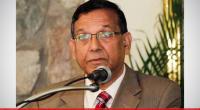 Criticizing the proposed budget announced this month, speakers at an event recommended the budgetary system be reformed to effectively impact the country’s sustainable development.
Criticizing the proposed budget announced this month, speakers at an event recommended the budgetary system be reformed to effectively impact the country’s sustainable development.
Speakers from the civil society of the country said there is a possibility of achieving something regardless of the budget allocation, if it is put into effective use on the country’s priority-based tasks.
The discussion program – Budget 2019-2020 and Civil Thought – organized by the Sushashoner Jonno Nagorik (Shujan), a civil society platform for good governance, was held at Dhaka’s National Press Club on Friday.
Keynote speaker Professor Dr. Rashed Al Mahmud Titumir said: “There is no practice of accountability in the budget system of Bangladesh. After the announcement of the proposed budget, its amendment was done through bureaucratic system without anyone being informed.”
“According to constitutional obligations, the amended budget becomes an Act without any discussion in the parliament. Moreover, there is no argument following the amendment’s cause or reason for not being implemented,” he added.
He said: “The MPs have no real power until the budget is passed, under the current constitution, which shows there is a lack of accountability and democratic practice in the whole process.”
MPs have no effective role in this process. Radical reform of the budget system is necessary, he recommended.
Qualitative issues
Columnist and former Secretary, Abdul Latif Mondol said: “We are always talking about the proposed budget but never analyze the supplementary and amended budget. These are the places where the government plays their tricks of doing wrong.”
Professor Anu Muhammad said that while analyzing the budget experts always highlight the allocated budget or quantity, but very few of the qualitative issues come into account.
Recently, a conversation about including taxation and GDP began, but the time has come to start talking about the given tax and services provided by the government, he said, adding: “If we do not get services for what we are paying then why should we pay?”
At first the budget procedure needs to amend a lot for it to be more effective, more sustainable. Civil society is urging government to change the fiscal year, as it does not comply with the country's changing climate and environmental system.
“We recommended setting the fiscal year to be either from April to March or from January to December. Other than Pakistan, and one or two more countries, following the less effective June-July session, the rest of the world has changed. So, why shouldn't we think of changing ours?,” the professor added.
Shujan President M Hafizuddin said: “Every year, the government presents a proposed budget, but where does the budget money go? The success rate of achieving the budget is never made public.”
“The country has yet to form a mechanism to publish the budget expenditures,” he said, adding that first, the government should announce the expenditures, and then announce the proposed budget.
BIDS researcher Nazneed Ahmed said: “While analyzing, we should look into how much budget was allocated, with regard to the policy undertaken by the government.”
Badiul Alam Majumder, secretary of Shujan said: “Development means improving peoples’ lives and economic status. If that is not achieved then how could it be termed as development?
“The budget is given in the traditional way, while making few additional changes. That will not bring any change for the country, whereas it is the reformation that the time demands.”
 National
National
41442 hour(s) 42 minute(s) ago ;
Afternoon 01:36 ; Wednesday ; Jul 09, 2025
Civil society calls for budgetary system reform
Send
Bangla Tribune Desk
Published : 19:44, Jun 21, 2019 | Updated : 19:46, Jun 21, 2019
Published : 19:44, Jun 21, 2019 | Updated : 19:46, Jun 21, 2019
0 ...0 ...
/hb/
Topics: Top Stories
- KOICA donates medical supplies to BSMMU
- 5 more flights to take back British nationals to London
- Covid19: Rajarbagh, Mohammadpur worst affected
- Momen joins UN solidarity song over COVID-19 combat
- Covid-19: OIC to hold special meeting
- WFP begins food distribution in Cox’s Bazar
- WFP begins food distribution in Cox’s Bazar
- 290 return home to Australia
- Third charter flight for US citizens to return home
- Dhaka proposes to postpone D8 Summit
Unauthorized use of news, image, information, etc published by Bangla Tribune is punishable by copyright law. Appropriate legal steps will be taken by the management against any person or body that infringes those laws.
Bangla Tribune is one of the most revered online newspapers in Bangladesh, due to its reputation of neutral coverage and incisive analysis.
F R Tower, 8/C Panthapath, Shukrabad, Dhaka-1207 | Phone: 58151324; 58151326, Fax: 58151329 | Mob: 01730794527, 01730794528


